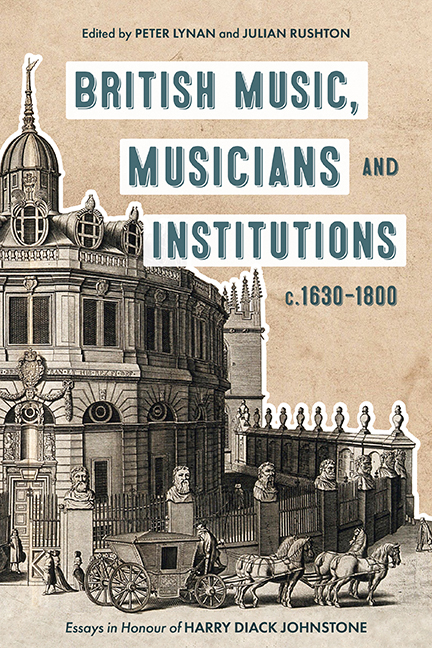Book contents
- Frontmatter
- Contents
- List of Illustrations
- List of Music Examples
- List of Contributors
- Acknowledgements
- List of Abbreviations
- Note to the Reader
- Introduction
- Part I Performers and Performance Style
- Part II Composers and Secular Institutions
- Part III Sacred Music and Institutions
- Part IV Dissemination: Copying, Printing, and Publishing
- Epilogue: Musica Britannica and the Eighteenth Century
- Harry Diack Johnstone: A Tribute
- Bibliography of the Publications of Harry Diack Johnstone
- Index
- Tabula Gratulatoria
Epilogue: Musica Britannica and the Eighteenth Century
Published online by Cambridge University Press: 06 October 2022
- Frontmatter
- Contents
- List of Illustrations
- List of Music Examples
- List of Contributors
- Acknowledgements
- List of Abbreviations
- Note to the Reader
- Introduction
- Part I Performers and Performance Style
- Part II Composers and Secular Institutions
- Part III Sacred Music and Institutions
- Part IV Dissemination: Copying, Printing, and Publishing
- Epilogue: Musica Britannica and the Eighteenth Century
- Harry Diack Johnstone: A Tribute
- Bibliography of the Publications of Harry Diack Johnstone
- Index
- Tabula Gratulatoria
Summary
Composers active in the middle of the eighteenth century, not only in Britain, have suffered neglect relative to the giants of ‘late baroque’ and late-century ‘classicism’. None of these giants was British, and while London visits contributed significantly to the careers of Handel, Gluck (a partial exception to mid-century neglect), Mozart, and Haydn, it was not necessarily native composers who affected them: Gluck and Haydn were impressed by Handel's oratorios, and the child Mozart learned much from ‘the London Bach’, Johann Christian. Other German immigrants (Pepusch, Lampe) contributed to popular types of opera in English, while visiting Italians (Bach notwithstanding) dominated opera under royal and noble patronage and in the person of Geminiani and others were a strong presence in instrumental music-making and publishing. Volume 4 of Burney's General History of Music devotes a whole chapter to ‘Italian opera in England [sic]’, disproportionate both to his discussion of opera elsewhere and to his relatively cursory treatment of native composers of his own time. Yet it would have been surprising if the wealthy nation that had recently produced Henry Purcell should lack competent composers with at least some flares of originality. Fine tunes for the period survive in popular esteem, but ‘Heart of oak’, ‘Tom Bowling’, ‘Cherry ripe’, and ‘The Ploughboy’ are perhaps perceived as ‘popular’ rather than composed.
The cloud covering eighteenth-century British composers is now clearing, thanks to enterprising performers and publishers, the Musica Britannica edition among them. The Royal Musical Association (RMA), instituted in 1874, declared no special interest in the music of any one period or nation. In late Victorian Britain at that time, outside Anglican traditions, patrons and public in theatres and concert halls were still prone to favour imported music over works by native composers. Yet the winds of change often referred to as the ‘English [sic] Musical Renaissance’ were already stirring, and by the mid-twentieth century the RMA undertook to publish, again with no stated preference for any one period, what were at first to be called ‘classics of English music’ – an Anglo-centric phrase that was fortunately short-lived. In 1976, after debate about its relationship with the RMA, Musica Britannica became a separate trust, but in practice it had operated independently from the start. Work was initiated by an editorial sub-committee appointed by the RMA in 1949, but by 1950 ‘Royal Musical Association’ had already been dropped from the headings of the (handwritten) minutes, and the body became, and remains, the ‘Editorial Committee of Musica Britannica’.
- Type
- Chapter
- Information
- British Music, Musicians and Institutions, c. 1630-1800Essays in Honour of Harry Diack Johnstone, pp. 263 - 276Publisher: Boydell & BrewerPrint publication year: 2022



